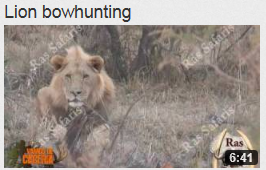News
Latest Lion Aid News
Trophy hunting should not be exempted from a scrutiny of trade impacts on conservation
Friday 23rd November 2012
|
Warning – graphic content. In this YouTube clip, a Spanish hunter travels to South Africa to shoot a “canned lion” full of arrows. The lion is trusting of the close approach of the bow hunter as he does not consider the proximity of humans to be dangerous as he was entirely raised in captivity. But that is not really the reason for this post. The Spanish hunter will have imported his trophy back home as a “personal and household effect”, therefore outside of any CITES or EU Wildlife Trade Regulations. Both these organizations do not consider trophies as trade in wildlife products. In fact, the Scientific Review Group of the EU WTR recently passed a “negative opinion” (no import) on lion “specimens” originating in South Africa, but as hunting trophies are just fine and dandy, they were exempted from the opinion. We have mentioned before on this site that the “exemption” offered to hunters is complete nonsense. The reason why CITES and the EU Wildlife Trade Regulations were established in the first place was to ensure that “trade” did not negatively affect the conservation status of the species. Well over 70% of the consumption of lion products is trophies, and to have them exempted from any trade designation is nonsense. Trophy hunting is a major industry estimated to be worth over $200 million in Africa per year. It is a destructive industry – Botswana recently announced they would end all trophy hunting in 2014 in favour of ecotourism. Hunting does not reward communities or conservation and is only there to support foreign hunters and foreign operators. In fact, there are now applications from the USA (polar bears) and Kenya (rhinos) to CITES that directly consider trophy hunting as a major component of offtake negative to species conservation. The EU WTR and CITES must begin to take a more informed approach to trade that considers trophy hunting offtake. Right now there is a “working group” tasked by CITES to evaluate the personal and household effects derogations. Over the past three years there has been no significant progress. The working group chairman is from China. We will use all means to ensure this exemption is no longer afforded. We will make a presentation to the UK Parliament Animal Conservation group in December to push for the UK Delegation to the CITES Conference of Parties in March 2013 to ask for a complete revision of such exemptions that lead to the destruction of African’s lions via “legal” loopholes. It is only then that the practice of shooting lions with arrows will be halted, and only then that excessive trophy hunting of lions in Zimbabwe (the EU Scientific Review Group passed “no opinion” = status quo for imports is accepted as there is no “evidence” that trade impacts lions) and Tanzania (the same group passed a “positive” opinion = all imports given a green light, meaning EU trade does not impact conservation status of Tanzania’s lions?) can be based on inclusive scientific information. No possibility of trophy import equals no hunting. Wildlife conservation is ultimately the responsibility of the African states as it is their national heritage that is directly affected by unsustainable offtake. Those same African wildlife range states are signatories to CITES and must ensure that trophy hunting offtake is carefully monitored in terms of impact on wildlife populations. In the mean time such states must also assess returns for such offtake in terms of their overall conservation strategies and projected income for their wildlife resources. Independently, CITES and the EU Scientific Review Group should carefully assess the impact of world and EU wildlife product offtakes. Only then will conservation versus current unsustainable utilization become adequately addressed. Picture Credit: http://www.youtube.com/verify_age?next_url=/watch%3Fv%3Dgaf_YR1GH5I Tags: CITES, EU, SRG, lion hunting, personal and household effect, Categories: canned hunting/Captive breeding, Trophy Hunting, Politics and Wildlife |
Add a comment | Posted by Pieter Kat at 14:08




